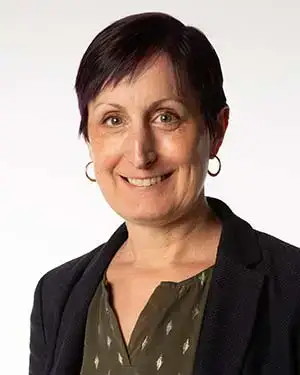The Faculty Convivium is a luncheon lecture series featuring SUNY Oneonta faculty who present their research and creative activity projects, accessible to the non-specialist, in a collegial atmosphere.
Seating is limited. To reserve a seat please call 607-436-2517 at least several days before a scheduled Convivium talk. Vegetarian meals are available.
Questions? Comments? Email a member of the Faculty Convivium committee.
Fall 2025 Lecture Series

Wednesday, September 24, 2025
12:00 PM - 1:00 PM Convivium Luncheon -Morris Otsego Grille
Presenter: Kirsten Robbins: Asst. Professor, Elementary Education
Title: Grading for Justice: Accessible Ungrading Practices
Abstract:
“Ungrading” has been gaining momentum as educators and researchers increasingly question the impact of traditional grading practices. A growing body of research suggests that conventional grading can be harmful to students, particularly those from marginalized backgrounds. Importantly, ungrading is not a single approach—it encompasses a range of strategies and philosophies. For some educators, the breadth of options can feel overwhelming or too far removed from familiar practices. This presentation will discuss research on two approachable ungrading strategies, outlining their benefits and potential challenges. The goal is to encourage educators to take meaningful, manageable steps away from traditional grading models.

Wednesday, October 22, 2025
12:00 PM - 1:00 PM Convivium Luncheon -Morris Otsego Grille
Presenter: Dr. Scott C. Maguffin, Earth and Atmospheric Sciences
Title: Of Rice and Fen: Toxic Trade-Offs in the World’s Most Important Grain
Abstract:
Rice feeds more than half the world’s population—but under certain conditions, it can accumulate harmful contaminants like arsenic and cadmium. Our research uses controlled-environment growth chambers to simulate field conditions and isolate the effects of soil type and irrigation strategy on contaminant and nutrient uptake in rice grain. These experiments parallel field work in Arkansas but allow for tighter control over environmental variables. While our broader dataset includes key nutrient metrics, this talk will focus on findings related to contaminants—specifically how alternate wetting and drying (AWD) irrigation and regional soil differences influence arsenic and cadmium levels in rice. The results have important implications for agricultural sustainability and public health.

Wednesday, November 12th, 2025
12:00 PM - 1:00 PM Convivium Luncheon -Morris Otsego Grille
Presenter: Ed Beck, Open & Online Learning Specialist
Teach the Engine not the App: AI Literacy through Creation
Fifteen years ago, iPads were the new technology on campuses. Today, it’s AI. There’s a temptation to buy a shiny thing and hope learning improves. We need a different move: teach the engine, not the app. When students open up technology, experimenting with buildable, open-source AI, they stop being tool users and become makers. When constructing their own tools, they might work like a data scientist, cleaning messy data, or they might work like qualitative researcher building a codebook for classification and analysis. That shift produces a different level of fluency, creativity, and portfolio worthy work that our students can leverage as they move onto their next steps beyond SUNY Oneonta. In this talk I will share my journey with open source technology and how it has shaped me as a professional, along with what I hope we will teach students about the next wave of technology.